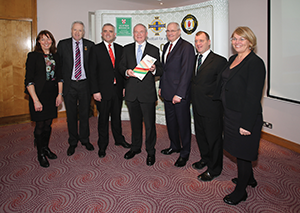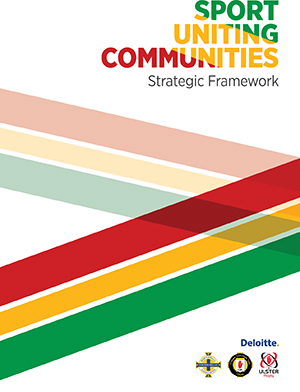Uniting communities

agendaNi reviews the recently published strategic framework for co-operation between the Irish Football Association, Ulster GAA and Ulster Rugby.
The multi-sport partnership between the Irish Football Association (IFA), Ulster GAA and Ulster Rugby has grown organically over the last number of years. Joint programmes by the three organisations have recognised the collective objectives of all three bodies including community development, good relations, club and volunteer development and capacity building.
These programmes have created opportunities to develop new ideas, models of delivery and have provided opportunity for shared learning and best practice. However, while the great strategic value and impact of this partnership is acknowledged, the framework notes the vital independence in the structures and strategic priorities of each organisation and claims that collaboration is only effective when most appropriate.
Collaboration
The framework document claims that the collaborative work to date has created space for policy and practice innovation and has served as a powerful example to wider society. The framework list the qualities of the collaboration as including:
• the successful track record of working collectively to deliver joint programmes;
• the strength of relationship that has developed between staff and officers in the governing bodies;
• flexibility to pursue initiatives collaboratively is enabled by the high level of trust and understanding between the codes;
• the reach and engagement the three sports can have across society;
• their cross border remit and international networks;
• an ability to leverage additional resources, whether private sponsorship, in-kind support or volunteer time against an investment.
The strategic aim of each individual body points towards the ambition to help achieve both sporting and wider societal goals. The strategic framework recognises that the three sporting codes offer a powerful combination of reach and connection with people’s lives. This reach, it claims, stretches across religious, class, ethnic, age, ability and gender backgrounds. By working together there are clear benefits for all participants, these include; sharing best practice, accessing resources, sharing resources and growing participation.
The framework also notes that by speaking collectively, the message from the three bodies will carry a significance, both in terms of the message content and due to its joint delivery. The framework is also optimistic that continued collaboration will reach schools and communities that would otherwise have not been engaged.
Clubs
The framework also has a section specifically set aside to stress the importance of local clubs and the many benefits they offer their local communities. The framework claims these clubs are the “hubs” of their local community and that “clubs that have succeeded in becoming community hubs with enhanced community impact also commonly relate to improved sporting performance.”
The framework also notes that the ‘Sport in the Community’ programme, a programme funded by the Department for Social Development in association with the IFA, Ulster GAA and Ulster Rugby, offered assistance to clubs across the three codes to develop into community hubs with better governance, and community impact. The benefits of this investment are, the framework notes, enhanced physical health and mental wellbeing as well as increased educational and employment opportunities for local residents.
Working with government
The strategy also notes that by coming together, the multi-sport partnership can contribute to local government, central government and European policy controls. The policy priorities of education, health and social policies are often connected but it can be difficult for central government to intervene in these areas. However, in contrast, the framework claims, sporting governing bodies and their clubs can work with people in a much more natural way. The framework states a collaborative effort between the three sporting bodies will delivery key policy priorities. These are:
• creating opportunities, tackling disadvantage and improving health and well-being;
• growing a sustainable economy and investing in the future;
• building a strong and shared community.
The framework also notes that the sporting bodies already have a successful track record of working with local government and following the recent local government reform there are enhanced opportunities to deliver against local government priorities. These include:
• community planning;
• urban regeneration and community development;
• leisure and health;
• local cultural development;
• local economic development;
• local tourism.
The collaboration also aligns with the following EU objectives for sport:
• encouraging physical and mental fitness;
• fostering a sense of social inclusion, eliminating racism and gender inequality;
• promoting greater participation in sport.
Strategic goals
 To achieve these strategic goals the framework clearly outlines how the three governing bodies are taking meaningful steps to work with each other from the top down. The leadership of the three governing bodies are working collectively to engage with European, central and local government on key issues. All three bodies will also actively work to collectively identify, develop and realise opportunities to deliver more in partnership with European, central and local government and with other stakeholders and support cross-community initiatives designed to develop an appreciation for all three sports.
To achieve these strategic goals the framework clearly outlines how the three governing bodies are taking meaningful steps to work with each other from the top down. The leadership of the three governing bodies are working collectively to engage with European, central and local government on key issues. All three bodies will also actively work to collectively identify, develop and realise opportunities to deliver more in partnership with European, central and local government and with other stakeholders and support cross-community initiatives designed to develop an appreciation for all three sports.
Speaking about the partnership between the three sporting bodies, DCAL’s deputy secretary, Cynthia Smith said: “There is growing evidence of the power of sport to bring people together. The latest household survey has revealed that over 91 per cent of the population actively engage in culture, arts or leisure. I doubt if any other part of government has such as direct impact on people’s lives.
“The sports of rugby, soccer and the GAA have used their pivotal role within their communities to increase participation levels and to foster a sense of social inclusion. These three organisations are well placed to the delivery of the key Executive priorities of growing the economy and tackling disadvantage.
“I welcome the commitment and desire of these three sporting organisations to build on the great work they have done to date and use their collective synergies to make a telling impact on the opportunities offered across government and by other stakeholders.”
The three Chief Executives of the sporting bodies also noted their commitment to strengthening the partnership and developing joint working strategies to further foster social inclusion, education, health and community development. The IFA’s Chief Executive, Patrick Nelson claimed he was looking forward to the strengthening of this partnership in years to come.
The CEO of Ulster GAA, Dr Danny Murphy said: “The launch of this joint strategic framework represents a significant milestone in the relationship between ourselves, Ulster Rugby and the Irish FA. The process has allowed us to reflect on some excellent work to date and to look forward with enthusiasm at our collective potential to make a major difference in communities across Ulster.”
His words were echoed by Ulster Rugby’s Chief Executive, Shane Logan who said: “The launch of the Sport Uniting Communities Framework demonstrates the commitment of Ulster Rugby, the Irish FA and Ulster GAA towards sustaining and growing this joint work and serving the community through sport.”





